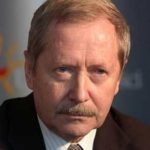
In October, the US Department of Defense released its 2022 Nuclear Posture Review (NPR). We ask members of our network: Did the US NPR meet the challenges of the “decisive decade” or represent the status quo in the US’s nuclear posture? Was the commitment to full-scope modernisation across the Triad sufficiently balanced with the “emphasis on arms control, nuclear non-proliferation, and risk reduction”?
“As the security environment deteriorates and several negative trends exacerbate nuclear risks and dangers, the US will rightly continue to bolster its defence capabilities and preparedness.”

Sylvia Mishra
New Tech Nuclear Officer, ELN
The US NPR 2022 comes out strong in favour of nuclear modernisation to sustain and develop capabilities to deter two nuclear-peer challengers – China and Russia. The NPR has broad elements of continuity with that of the 2010 and 2018 NPRs. The Biden administration will continue to field the W76-2 thermonuclear warhead introduced during the Trump administration. As the security environment deteriorates and several negative trends exacerbate nuclear risks and dangers, the US will rightly continue to bolster its defence capabilities and preparedness. Simultaneously, the NPR 2022 emphasises advancing nuclear non-proliferation and arms control through a mix of military de-confliction, crisis communication, information sharing, strategic dialogues, mutual restraint, and nuclear risk reduction initiatives. The administration places a premium on enhancing transparency and predictability in relations and indicates a willingness to engage with adversaries where it must diffuse tensions. The NPR details how the US is reinforcing integrated deterrence to work seamlessly across warfighting domains, theatres, and the entire spectrum of conflict, including allies and strategic partners. Emerging technologies deservedly get the attention it merits. The NPR balances ideas of integrating emerging tech into military operations while outlining that the US will take a leadership role in shaping norms and conduct of behaviour in cyber, space, and artificial intelligence.
“Given the unique situation resulting from an aggressive Russian posture, the NPR confirms a long-standing US commitment to tailoring deterrence and assurance policy to the regional environment in compliance with the security requirements of the Allies and partners.”

Janusz Onyszkiewicz
Former Defence Minister and Chair, Executive Council, Euro-Atlantic Association (Poland), member of the ELN senior network
The Nuclear Posture Review (NPR) of 2022 confirms the main facets of the US nuclear policy, whose primary goals are to deter aggression, assure Allies and partners, and allow the US to achieve objectives if deterrence fails. In contrast with its “principal competitors”, the US committed to modernising nuclear forces, not by expanding and developing “novel nuclear-capable systems designed to hold the US homeland and Allies and partners at risk” but by their replacement. The NPR confirms US commitments to arms control risk reduction and non-proliferation, including problems of North Korea and Iran.
What makes the new NPR different from the NPR of 2018 is the assessment of the 2022 security environment. In President Trump’s NPR, we can read that “the United States does not wish to regard either Russia or China as an adversary and seeks stable relations with both(…) We look forward to conditions that would once again allow for transparent and constructive engagement with Russia”. By contrast, according to the NPR2022, “Russia (…) presents an enduring and existential threat to the United States and our Allies and partners”. Russia’s conduct is described as “characterised by irresponsible sabre-rattling”, and Russian leaders “have made clear that they view (nuclear weapons) as a shield behind which to wage unjustified aggression against their neighbours”.
Given the unique situation resulting from an aggressive Russian posture, the NPR confirms a long-standing US commitment to tailoring deterrence and assurance policy to the regional environment in compliance with the security requirements of the Allies and partners.
“The main task of the non-classified NPR is to inform allies and adversaries. One of the key signals is that nuclear deterrence commands a central role that underpins “all national defence priorities” in the US.”

Tetiana Melnyk
Research Consultant at the Odessa Center for Nonproliferation and member of the YGLN
Russian full-scale attack has restricted Biden’s options to implement promised “reduction of the role of nuclear weapons”. While it remains a core goal in the NPR 2022, it is unthinkable in these circumstances to move to the dyad or stop modernising arsenals. “No first use” and “sole purpose” are explicitly named as holding “an unacceptable level of risk” on the declaratory level following consultations with allies and reflecting their fears for extended deterrence.
Technically, we see in the NPR a return to the one-warhead policy rhetoric of the Obama era (while keeping more in storage). There is continuity of the open-sea targeting (while reverted quickly and automatically upon task), combined with the end to the SLCM-N programme (which fails to achieve bipartisan support), and the B83 gravity bombs retirement (planned to be replaced by lower-yield W76-2). But on the certainty/uncertainty balance, the NPR reduces the “extreme circumstances” examples of a nuclear attack to include a “near-simultaneous conflict with two nuclear-armed states” regardless of location, yield, or non-nuclear strategic-level attack.
But the main task of the non-classified NPR is to inform allies and adversaries. One of the key signals is that nuclear deterrence commands a central role that underpins “all national defence priorities” in the US. It presents Russia as an “enduring existential threat”, China as an “overall pacing challenge”, DPRK as being a “persistent threat” whose nuclear attack “will result at the end of that regime”, and for Iran, offers a chance to negotiate.
While nuclear non-proliferation and disarmament – including multilateral efforts of the international community such as the Comprehensive Test Ban Treaty (CTBT) and Fissile Material Cut-Off Treaty (FMCT) – are given much more attention than in Trump’s version, the focus of the NPR is still on the side of arms control.
The opinions articulated above represent the views of the authors and do not necessarily reflect the position of the European Leadership Network or all of its members. The ELN’s aim is to encourage debates that will help develop Europe’s capacity to address the pressing foreign, defence, and security policy challenges of our time.



